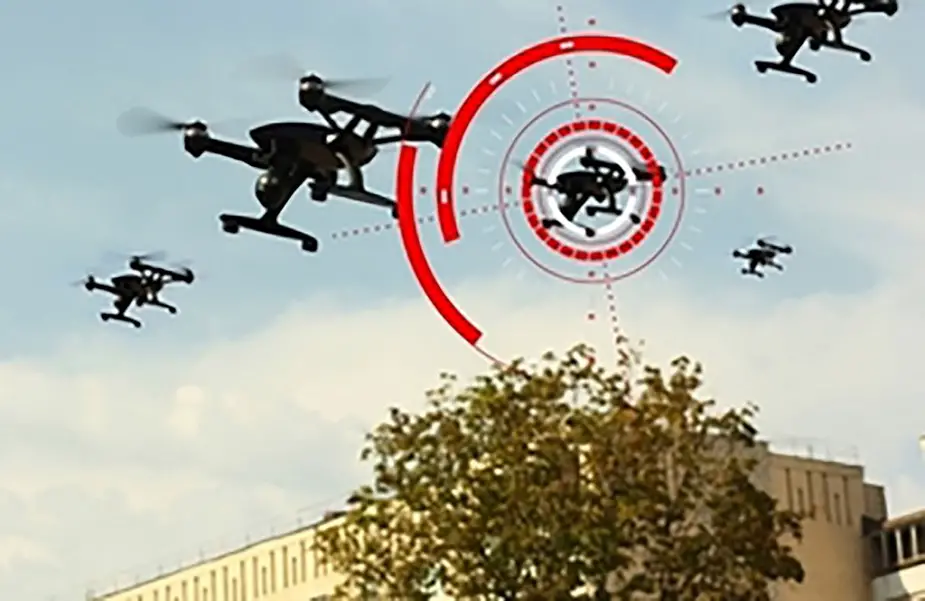Breaking news
UK: DASA awards £2m contracts to counter hostile drone threats.
The Defence and Security Accelerator (DASA) has announced that it has awarded nearly £2m to develop new capabilities to detect, disrupt, and defeat the hostile and malicious use of drones.
 The introduction of Unmanned Air Systems (UAS), often referred to as drones, has been one of the most significant technological advances of recent years and represents a shift in capability of potential adversaries (Picture source: UK MoD)
The introduction of Unmanned Air Systems (UAS), often referred to as drones, has been one of the most significant technological advances of recent years and represents a shift in capability of potential adversaries (Picture source: UK MoD)
Eighteen bids have been funded as part of the Countering Drones competition launched earlier this year by the then-Defence Secretary.
Among the proposal being developed are methods for detecting 4G & 5G controlled drones, cutting edge applications of machine learning and artificial intelligence for sensors to automatically identify UAVs, and low risk methods of stopping drones through novel electronic defeat or interceptor solutions.
The competition, run by DASA – the MOD’s innovation hub – on behalf of Defence Science and Technology Laboratory (Dstl), is the latest stage in Dstl’s ongoing research programme into countering unmanned air systems (UAS) which has been running for ten years.
The competition has also been supported by the Department for Transport and NATO to counter the rapidly evolving threats from UAS.
David Lugton, competition technical lead, said:
"The introduction of Unmanned Air Systems (UAS), often referred to as drones, has been one of the most significant technological advances of recent years and represents a shift in capability of potential adversaries."
"The threat from UAS has evolved rapidly and we are seeing the use of hostile improvised UAS threats in overseas theatres of operation. There is a similar problem in the UK with the malicious or accidental use of drones becoming a security challenge at events, affecting critical infrastructure and public establishments; including prisons and major UK airports."
There was a very high level of interest from industry with over 90 bids from a wide range of organisations from micro businesses, small and medium-sized enterprises, large defence firms and academia.
This led to a doubling of initial funding from around £1m to around £2m being awarded to organisations in Phase 1.
The first phase of this competition is intended to demonstrate proof of concepts that can be further developed and integrated during later phases.
Phase 2 is planned to launch next year with a focus on developing and maturing successful research into integrated solutions
The 18 projects funded around £100,000 each are:
- Airspeed Electronics Ltd – to develop an artificial intelligence detection system which uses acoustic sensors.
- Animal Dynamics – to develop UAS swarm system to detect and neutralise.Unmanned Air Vehicles (UAV) by employing peregrine falcon attack strategies.
- Autonomous Devices Limited – to develop interception technology.
- BAE Systems Applied Intelligence Ltd – to develop electromagnetic defeat of UAS.
- BAE Systems Applied Intelligence Ltd – to develop passive radar for detection of UAVs.
- Cubica Technology Ltd – to develop an automatic recognition and targeting system of UAVs from large distances.
- MBDA UK Ltd – to demonstrate an integrated system to detect, track and intercept hostile drones.
- Northrop Grumman – to develop UAS defeat using cyber and sensor vulnerabilities.
- Northumbria University – to develop anti-swarm drone technology.
- PA Consulting – to develop a detection system against cellular controlled UAS.
- Plextek Services Limited – to develop detection and signal jamming capability for UAS.
- Plextek Services Limited – to develop miniature Counter-UAS radar.
- QinetiQ – to develop a drone tracking system in complex environments.
- QinetiQ – to develop a ‘hard kill’ for disrupting the UAV’s on board electronics.
- RiskAware Ltd – to develop an automated drone identification and target tracking system.
- Thales UK – to develop a machine learning for Counter-UAS radar.
- University College London – to develop signal processing and machine.learning algorithms to identify drones in areas highly populated by birds.
- An additional proposal, subject to contract.
Phase 1 of the competition is due to run until summer 2020.



















